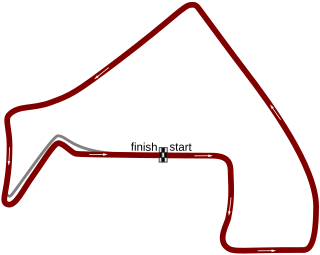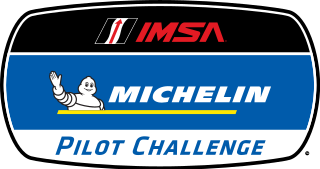Related Research Articles

The Trans-Am Series presented by Pirelli is a sports car racing series held in North America. Founded in 1966, it is sanctioned by the Sports Car Club of America (SCCA). Primarily based in the United States, the series competes on a variety of track types including road courses and street circuits. Trans-Am is split into the TA and TA2 classes for silhouette racing cars, while its production classes are the GT, SGT, and XGT.
Dorsey Alan Schroeder is an American race car driver. Since August 2015, he has served as Race Director for the Pirelli World Challenge series and since 2018 Race Director for the Trans Am Series presented by Pirelli SCCA Pro Racing. Over the course of his career in Sports car racing, he has won 40 professional races in 242 starts, including seventeen Trans-Am series wins. He also oversees the competition on-track at HSR events and enjoys racing vintage cars.

Paul Gentilozzi is a race car driver and businessman. His non-racing business interests are real estate development, principally developing office buildings for institutions and government agencies.

John Martin was a driver in the USAC and CART Championship Car series.

The Circuit Trois-Rivières is a street circuit in Trois-Rivières, Quebec, Canada. The circuit has been the home of the annual Grand Prix de Trois-Rivières, the longest-running street race in North America, since 1967. The circuit is located on the Terrain de l'Exposition (fairgrounds) and is unusual in that it passes through Porte Duplessis, the narrow concrete gateway of the grounds at turn 3.

The Michelin Pilot Challenge is a grand touring and touring car racing series run by the International Motor Sports Association. Originating from the Canadian Motorola Cup, the series was taken over by Grand-Am in 2001 to become the Grand-Am Cup following the demise of rival IMSA's Firehawk series of similar rules in the US. KONI became series sponsor for the start of the 2007 season when the series became known as the KONI Challenge Series, before renaming once more prior to the start of the 2009 season as the KONI Sports Car Challenge. The series name was once again changed for the 2010 season to Continental Tire Sports Car Challenge. In 2019, the series rebranded again after Michelin was selected to become the new official tire supplier of the series and thus simplified their branding name by removing Sports Car term.

Tomy Drissi is an American professional stock and sports car racing driver, and an advertising executive in the movie industry. A long-time competitor in the Sports Car Club of America's Trans-Am Series, he was the series' 2009 Champion.

The Trans-Am Series, Rolex Sports Car Series, and American Le Mans Series have all held races in the Miami area.
The 1966 Trans-American Sedan Championship was the inaugural running of the Sports Car Club of America's Trans-Am Series auto racing series. It was open to FIA Group 1 and FIA Group 2 cars and was contested over seven races. Manufacturers titles were awarded for both Over 2 Liter and Under 2 Liter cars with Ford and Alfa Romeo winning their respective class championships. Horst Kwech and Gaston Andrey were subsequently named Drivers co-champions in 1980 when the SCCA retroactively named drivers championships for the series after the 1980 season.
The 1967 Trans-American Championship was the second running of the Sports Car Club of America's Trans-Am Series. After the dominance of Alfa Romeo in the under 2000cc class in 1966, Porsche would rise to prominence, starting a dynasty that would last for several years. 1967 would also mark the debut of Mercury, with Dan Gurney winning at Green Valley for the company in its new Cougar. David Pearson would also win in a Cougar at Riverside later that year. Ford and Mercury would both end the year strongly, with four wins apiece. Mark Donohue would provide the first win in the series for Chevrolet at Marlboro Speedway. He would go on to win at Stardust and Pacific Raceways, igniting the Ford vs Chevy rivalry that made the series legendary.
The 1968 Trans-American Championship was the third running of the Sports Car Club of America's Trans-Am Series. 1968 marked the addition of the 12 Hours of Sebring and the 24 Hours of Daytona, the only year that the Trans-Am Series featured those races. The season also marked the first time that an event was held outside of the United States, when a race at Mont-Tremblant brought Trans-Am into Quebec, Canada.
The 1969 Trans-American Championship was the fourth running of the Sports Car Club of America's Trans-Am Series. The championship was open to SCCA Sedan category cars competing in Over 2 liter and Under 2 liter classes. 1969 marked the end of the use of co-drivers in the Trans-Am Championship, as most of the races were between 2.5 and 3 hours. The Over 2 liter and Under 2 liter Manufacturers' titles were won by Chevrolet and Porsche respectively.
The 1970 Trans-American Championship was a motor racing series organised by the Sports Car Club of America for SCCA Sedans. It was the fifth Trans-Am Championship. Ford and still potent Alfa Romeo won the Over 2 Litre and Under 2 Litre titles respectively.
The 1971 Trans-American Championship was the sixth running of the Sports Car Club of America's Trans-Am Series. The format was altered to an over 2500cc class and an under 2500cc class, up 500cc from past years. All races used split classes except where noted. The year marked the rise of Datsun as a competitive brand, with the Japanese company winning several races throughout the season. American Motors, led by Mark Donohue's 7 wins, and Datsun, led by John Morton's 6 wins, won the manufacturers' championships.
The 1972 Trans-American Championship was the seventh running of the Sports Car Club of America's Trans-Am Series. The first seven rounds used split classes, while the last four rounds had the Under 2500cc class only. Milt Minter brought Pontiac its first win, at Mid-Ohio. George Follmer and American Motors won the over 2.5L division, while John Morton led Datsun to the championship title of the "Two-Five Challenge".

Christopher Dyson is an American professional racing driver who competed in the American Le Mans Series for Dyson Racing from 2002 to 2013. He is currently competing in the Trans-Am Series in the TA class under the CD Racing banner where he just clinched his third consecutive TA championship (2021-2023). The son of team owner Rob Dyson, Chris is a two-time ALMS champion, having taken the LMP675 Drivers title in 2003 and earning the LMP1 Championship in 2011. He is the Vice President and Sporting Director of Dyson Racing.
The 1973 Trans-Am Series was the eighth running of the Sports Car Club of America's premier series. It began on April 15 and ran for six rounds. Due to the decline of demand for muscle cars in the early seventies and the energy crisis that year, 1973 is considered to be the beginning of the decline of Trans Am. In contrast to American muscle dominating previous years, Porsche won the manufacturers' championship this year. 1973 also saw the rise of silhouette cars as a way of adapting to the decline of performance cars, ultimately making the cars interchangeable with IMSA GTO and GTU.
The 1980 Trans-Am Series was the fifteenth running of the Sports Car Club of America's premier series. After several years of recovery from the decline of demand for muscle cars in the early seventies and the 1973 Oil Crisis, Trans Am evolved into a support series for the IMSA GT Championship, using vehicles that were also used in IMSA GT races. This would set the standard for the series thereafter, and this standard would be applied to the SCCA's World Challenge series many years later. Almost all of the races ran for approximately one hundred miles. Besides Watkins Glen, the only exception was Trois-Rivières.
The 1982 Trans-Am Series was the seventeenth running of the Sports Car Club of America's premier series. All races ran for approximately one hundred miles. The successful Datsun brand saw its final Trans Am victory in 1982, although the Nissan brand which replaced it did see notable success thereafter.
Rocketsports Racing was a motor racing team based in East Lansing, Michigan in the United States.
References
- ↑ http://cms.scca.com/documents/Pro%20Racing/Archives/Trans-Am/1983.pdf%5B%5D
- ↑ "Trans-Am (Page 2) – Championships – Racing Sports Cars". Archived from the original on December 11, 2013.